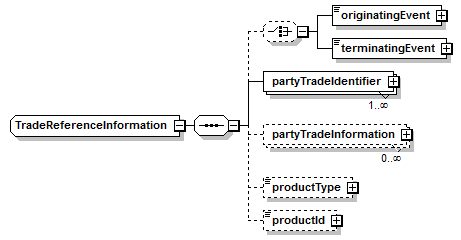
Namespace: |
|
Content: |
complex, 6 elements |
Defined: |
globally in fpml-business-events-5-8.xsd; see XML source |
Includes: |
definitions of 6 elements |
Used: |
at 1 location |

XML Representation Summary |
|||||
<...> |
|||||
|
|||||
</...> |
|||||
|
<xsd:sequence>
<xsd:choice minOccurs="0">
</xsd:choice>
<xsd:element maxOccurs="unbounded" minOccurs="1" name="partyTradeIdentifier" type="PartyTradeIdentifier"/>
<xsd:element maxOccurs="unbounded" minOccurs="0" name="partyTradeInformation" type="PartyTradeInformation"/>
</xsd:sequence>
</xsd:complexType>
|
Type: |
OriginatingEvent, simple content |
|
xsd:normalizedString
|
maxLength: |
255
|
minLength: |
0
|
Type: |
PartyTradeIdentifier, complex content |
|
<xsd:element maxOccurs="unbounded" minOccurs="1" name="partyTradeIdentifier" type="PartyTradeIdentifier"/>
|
Type: |
PartyTradeInformation, complex content |
|
<xsd:element maxOccurs="unbounded" minOccurs="0" name="partyTradeInformation" type="PartyTradeInformation"/>
|
Type: |
ProductId, simple content |
|
xsd:normalizedString
|
maxLength: |
255
|
minLength: |
1
|
Type: |
ProductType, simple content |
|
xsd:normalizedString
|
maxLength: |
255
|
minLength: |
0
|
Type: |
TerminatingEvent, simple content |
|
xsd:normalizedString
|
maxLength: |
255
|
minLength: |
0
|
|
XML schema documentation generated with DocFlex/XML 1.9.0 using DocFlex/XML XSDDoc 2.8.0 template set. All content model diagrams generated by Altova XMLSpy via DocFlex/XML XMLSpy Integration.
|